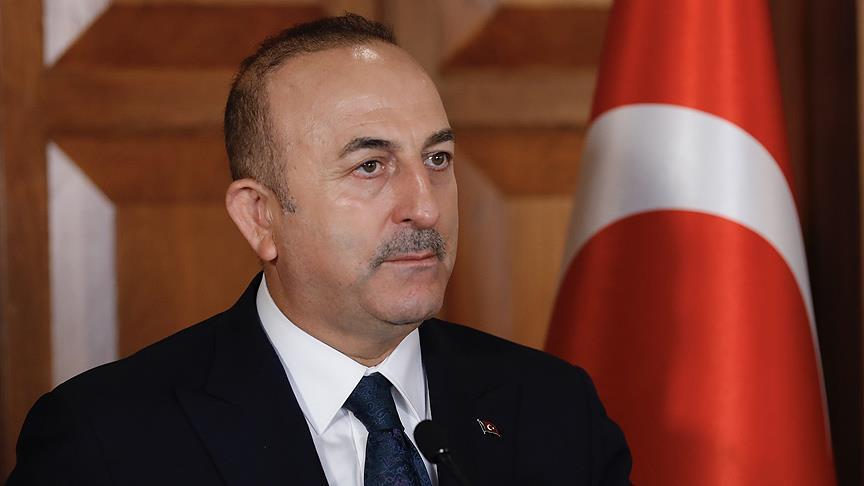US’ Syria troop pullout shouldn’t serve PYD/YPG: Turkey
Foreign Minister Mevlut Cavusoglu also says Turkey has the power to single-handedly neutralize Daesh in Syria

By Nazli Yuzbasioglu
ANKARA
Turkey has made clear that the process of withdrawing U.S. troops from Syria should not serve the terror group PYD/YPG, the country’s foreign minister said on Tuesday.
Reviewing foreign policy developments this year for reporters in the capital Ankara, Mevlut Cavusoglu said: “We’ve clearly conveyed that the process should not serve the separatist agenda of the PYD/YPG.”
Turkey and the U.S. agreed to complete the Manbij roadmap before the U.S. finishes its withdrawal from Syria, Cavusoglu added.
On Nov. 1, Turkish and U.S. troops began joint patrols in Syria's northwestern Manbij as part of an agreement that focuses on the withdrawal of PKK/YPG terrorists from the city to stabilize the region.
Cavusoglu stressed that France's presence in Syria to protect the terrorist YPG would help neither France nor the YPG.
Turkey has the power to single-handedly neutralize Daesh in Syria, Cavusoglu added.
Turkish President Recep Tayyip Erdogan has signaled that a cross-border operation against the terrorist PYD/YPG in Syria will happen soon. Since 2016, Ankara has carried out two similar military operations in northern Syria.
U.S. President Donald Trump last week made the surprise announcement that the U.S. would withdraw its troops from Syria. His decision followed a phone call with Erdogan in which the two leaders agreed on the need for more effective coordination over the civil war-torn country.
Yemen crisis
Turning to the humanitarian crisis in Yemen, Cavusoglu said Turkey called on the Organization of the Islamic Cooperation (OIC) contact group to hold a meeting in Istanbul on Jan. 10 to discuss the situation.
Yemen has been dogged by conflict since 2014, when Houthi rebels overran much of the country, including the capital Sanaa, forcing the government to take up temporary residence in the coastal city of Aden.
The following year, Saudi Arabia and several of its Arab allies launched a massive air campaign in Yemen aimed at retaking Houthi-held territory on behalf of the country’s pro-Saudi government.
The air campaign has devastated much of Yemen's basic infrastructure, including health and sanitation systems, prompting the UN to describe the situation as “one of the worst humanitarian disasters of modern times.”
US sanctions on Iran
On the U.S. sanctions on Iran and its decision to withdraw from a nuclear arms treaty, Cavusoglu said he hoped Trump would reverse these decisions.
Voicing his hopes that problems are resolved through dialogue, Cavusoglu said: “Turkey will do its part in this.”
In August, the U.S. re-imposed the first round of sanctions that mainly targeted Iran’s banking sector.
The second phase of sanctions -- targeting Iran’s energy sector -- came into effect on Nov. 5, although Washington granted a 180-day reprieve to the eight largest buyers of Iranian oil, including Turkey.
The 1987 Intermediate-Range Nuclear Forces (INF) treaty was largely designed to stave off the prospects of nuclear war in Europe.
On Oct. 21, Trump announced his intention to withdraw from the treaty.
Khashoggi killing
Touching on the Oct. 2 killing of Saudi journalist Jamal Khashoggi, Cavusoglu said: “Everybody has an expectation from the international community, particularly from the UN.”
Without specifying any country, he said: “Our contacts are ongoing with some countries to jointly apply to the UN.”
Khashoggi, a columnist for The Washington Post, went missing after entering the Saudi Consulate in Istanbul on Oct. 2.
After producing various contradictory explanations, Riyadh acknowledged he was killed inside the diplomatic building, blaming the act on “rogue” operatives.
Turkey’s EU relations
Cavusoglu said that although this year Turkey and the EU started to get relations back on track, no new chapters in its accession negotiations were opened.
“We could get concrete results with the EU in many areas such as visa-free travel, updating the Customs Union agreement, resolving problems in the migration agreement, the EU fulfilling its duties, and the fight against terrorism,” he said.
Cavusoglu also reiterated Turkey's repeated call for reforms to the EU and the United Nations.
“Neither of these organizations, set up in the wake of World War II, is able to meet the expectations of Europe or the world,” he said.
Anadolu Agency website contains only a portion of the news stories offered to subscribers in the AA News Broadcasting System (HAS), and in summarized form. Please contact us for subscription options.








